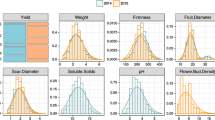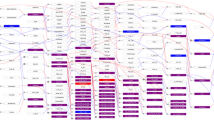Abstract
Pedigree and DNA marker-based methods were used to predict the performance of triploid progeny from tetraploid-diploid crosses, based on parental heterozygosity, genetic relatedness, and expected contribution to their progeny. There was no significant correlation between parental and progeny performance. Prediction of progeny bunch weight was best when based on genealogical distance and equal parental contribution. Predicted fruit size was most accurate when DNA marker data were used and the assumption of an unequal parental contribution was made. Consideration of parental heterozygosity produced larger residuals for all traits. No statistically significant differences were found between the mean residuals obtained under the assumption of an equal vs an unequal contribution of the 4x and 2x genotypes to their 3x progeny, regardless of the method used to estimate genetic relationships.
Similar content being viewed by others
Author information
Authors and Affiliations
Additional information
Received: 29 October 1997 / Accepted: 14 July 1998
Rights and permissions
About this article
Cite this article
Tenkouano, A., Crouch, J., Crouch, H. et al. Comparison of DNA marker and pedigree-based methods of genetic analysis in plantain and banana (Musa spp.) clones. II. Predicting hybrid performance. Theor Appl Genet 98, 69–75 (1999). https://doi.org/10.1007/s001220051041
Issue Date:
DOI: https://doi.org/10.1007/s001220051041




